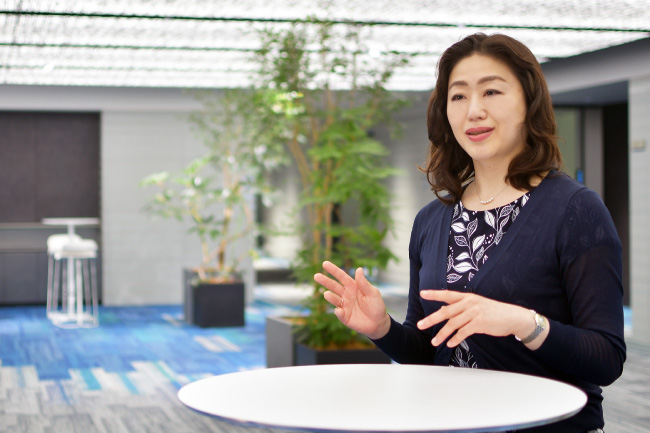Global Site
Breadcrumb navigation
My message to colleagues—especially those hesitant to take on managerial positions: Keep your identity and enjoy diversity!
Miho Naganuma, Executive Professional, NEC Digital Trust Business Strategy Department
Jul 7, 2022

The numerical targets for women in managerial positions and diversity are just milestones for achieving "a society where everyone with the determination to take on challenges has the opportunity to do so." We spoke with Ms. Miho Naganuma, an Executive Professional with the NEC Digital Trust Business Strategy Department, about ensuring inclusion and diversity so that diverse human resources can play an active role. As someone who has built a career focused on cybersecurity and gained international experience, we also asked about her career perspective and thoughts on being part of NEC now.
One step at a time: as a professional and as an individual
──You have built your career as a security professional.
After completing post-graduate degrees in the UK, I began my career as a security consultant for Hewlett-Packard Japan (HP). Since then, I have witnessed and enjoyed many innovations and business changes in the IT business environment.
Depending on the era and the factors being focused on, the word "security" has been used over the years to refer to network security, information security, cybersecurity, and more. After leaving HP, I worked at a security vendor before joining NEC in 2015. I was given opportunities to challenge myself in a new workplace at a time when risks were increasing and security was evolving. At NEC, I am engaged in the state-of-the-art digital trust business, including human rights and privacy issues related to AI. I find it very rewarding both in terms of social contribution and expanding my career.
──You have been on a professional career track for most of your career in an industry where women were the minority.
Decades ago, when I first joined HP, it was true that I encountered negative reactions from customers who were surprised to find out that the person in charge was a woman. However, I have seen that you can gain the trust of customers as a professional if you diligently tackle the tasks at hand and deliver results. Once you gain that trust, you are recognized as an individual professional regardless of gender. I have built my career by carrying out my work professionally as an individual and by learning from my senior colleagues without being conscious of gender distinctions.
The situation might be a bit different, however, once you find yourself in a managerial position. Even when I was just starting out, I was often told that there are no role models for female managers. Some colleagues even quit or left because it was a physically demanding job, lamenting that the future is uncertain.
Landing a managerial position was unexpected: Speaking from experience
──You joined NEC as a professional, and you currently hold a managerial position as Director of the Regulation Research Office.
About three years after joining NEC, my boss at the time approached me with an offer for a managerial position, which came as a surprise. Although I had experience as a group leader in the past, once I set off on the path to become a full-pledged manager, I realized that it required using a completely different part of my brain. With routine daytime work, global meetings at night, and various tasks coming up throughout the workday, you find yourself constantly flipping the switch in your brain to tend to the task at hand. This requires taking multitasking to a whole new level.
It was also interesting to listen to the opinions of members in the organization, ask them about what they pride themselves in, and to try to change their mindset. Being in a managerial position, I have become more interested in the organization as a whole and am now more aware that I am part of the company. This was also a new discovery on my part.
──Some people don't want to be in a managerial position.
"I just can't work that hard" or "I don't want to work that hard." These are the reactions I would hear when I told young colleagues that being in a managerial position as a woman is an exciting experience.
We cannot force people to do something they really do not want to do. But if you keep up the hard work and have the desire to take on new challenges, the right opportunity will come to you. This is why it is important to be prepared for when the time comes. Another thing I can say from my own experience is that you don't really understand something until you actually experience it. There is nothing more powerful than a message spoken from your own experience.
──What kind of support can those around you offer?
I still often hear people—particularly women—say that they have no role model. However, even if you don't have a role model, you can find a mentor who gives you advice and guidance to push for what you need. Here, gender is irrelevant—along the way, I have had male mentors who provided me with encouragement and guidance. It's important to find someone who will stand beside your views rather than someone who says, "I did it so you can" or "I did it so you should."

Numerical targets are just milestones: Bringing transparency to the process
──The NEC Mid-term Management Plan 2025 calls for the ratios of female managers and female or non-Japanese executive officers to both reach 20%.
While numerical targets are of course important, they are just milestones. Our ultimate goal is to ensure the active participation of diverse talent. We need to become a company where those who are willing to take on challenges are given equal opportunity and selected as leaders through a transparent process rather than screening by gender or nationality. When we compete on a global level, outdated values and organizations cannot remain static. We must become an appealing company where everyone can play an active role.
──You find yourself being given more and more opportunities to convey your message to others through appearances at events such as the International Conference for Women in Business held in July (for which NEC was a Gold Partner), which is the largest diversity conference in Japan.
I am currently working on establishing the digital trust strategy for AI as well as creating international standards and rules for future technology and regulatory areas. This requires having a strong sense of my own identity. Without it, you can neither refuse what you cannot accept, nor can you stand by your own decisions.
Diversity is not just about acceptance; diversity becomes meaningful when we communicate with one another in a logical and simple manner. We need to listen to others, express our views, brainstorm together, and work to make things better. This requires practice and experience. Discussions on gender are just one step toward this. My wish is that more and more people will develop a strong sense of identity, accept and enjoy diversity, and take on leadership roles.